Abstract
Within the past decade, sustainable development has become a global concern, leading the nations toward building sustainable states according to the goals established collaboratively. Qatar is one of the countries committed to the achievement of sustainable development goals by 2030, which is outlined in the country’s national strategy document entitled the Qatar National Vision 2030. While the implementation of sustainable goals is well-planned, the role of social resilience is proved to be an immediate element for sustaining any success in this realm. In the light of recent crises affected by the COVID-19 pandemic, the academic field has acknowledged that resilience is pivotal for contemporary societies to manage change and survive the crises without significant losses. Therefore, the lack of social resilience and the insufficient governmental efforts aimed at improving national resilience might hinder the overall effectiveness of sustainable development goal achievement.
This research project has been developed to investigate the relationship between social resilience and sustainable development goals in Qatar. It was hypothesized that without properly built social resilience, the state is incapable of preserving its achievements in the sustainable development domain. This hypothesis was further specified in the research questions aimed at investigating the relationship between social resilience and sustainable development, the role of social resilience in Qatar’s well-being, security, and post-implementation outcomes. The study used a mixed-method design in three stages, namely extended literature review, text-mining of the Qatar National Vision 2030 document, and a survey with Qatar’s population. The surveys have been conducted with civilian citizens without concern about their organizational affiliation; the data is stored on hardware. The findings allowed for supporting the hypothesis and indicated that social resilience is a pivotal element in sustaining state development. The national strategy lacks proper resilience-related strategies; the population has limited awareness about the strategy and is not satisfied with the level of resilience in the state. Practice implications and recommendations for state authorities, communities, and researchers have been generated and outlined in the research study.
Glossary
- Sustainable development is “a process of uniting, formerly independent, social, economic and environmental policies into a systems approach” (Richer, 2014, p. 1).
- Sustainable development goals are the anticipated outcomes of national strategies implemented globally to achieve sustainable development (Stafford-Smith et al., 2017).
- The Qatar National Vision 2030 is a national strategy document outlining the principles and goals aimed at advancing policies within the economy, politics, society, environment, and sustainability to create a better future for new generations (General Secretariat for Development Planning, 2008).
- Social resilience is “society’s ability to withstand adversity with its values and institutions remaining intact” and to “cope with a changing, sometimes hostile, environment by changing and readjusting in a new and innovative way” (Kimchi et al., 2019, p. 722).
Introduction
During the years of its independent development, Qatar has established itself as a country with a solidified national strategy toward sustainable development. Since its independence in 1971, the state of Qatar has advanced significantly in terms of strategic planning and implementation aimed at sustainability achievement in such domains as environmental, economic, and social. Indeed, with the announcement of the Qatar National Vision 2030, the leadership of the state launched a two-decade process of reforming the country to achieve sustainability goals. The main national strategic goal is to transform Qatar into “an advanced country by 2030, capable of sustaining its development and providing a high standard of living for all of its people” (General Secretariat for Development Planning, 2008). According to Richer (2014), “sustainable development is not merely a goal to be reached; it is a process of uniting, formerly independent, social, economic and environmental policies into a systems approach” (p. 1). One of the essential elements in achieving such a systemic change is the implementation of a strong resilience strategy.
Through a resilient society, the state will be able to achieve its goals in four basic strategic realms, namely economic, environmental, social, and human development. However, such a broad spectrum of developmental change in the state requires the solidification of resources and efforts. Being a vulnerable country, Qatar is exposed to multiple threats imposed by the unstable economic and political environment in the Middle East, which might negatively impact the social and human spheres. That is why Qatar’s development is at a continuous existential risk, its competitive advantage is still vulnerable, and its security is threatened by “large neighboring countries and the domino effect of regional instability” (Baabood, 2017, p. 1). Thus, it is vital to preserve and increase economic, human, environmental, and social achievements. Therefore, for Qatar to sustain its development in these key areas for becoming a qualitatively new state, it should pay much attention to advancing its strategy for building a resilient society.
Research Question and Hypothesis
The main document that outlines Qatar’s national sustainable development strategy is the Qatar National Vision 2030. In this document, the state authorities present an array of principles and goals aimed at advancing policies within the economy, politics, society, environment, and sustainability to create a better future for the new generations (General Secretariat for Development Planning, 2008). However, the document does not explicitly address the concept of resilience. This study was designed to investigate the importance of integrating the concept of resilience into the national sustainable development strategy in Qatar as informed by the Qatar National Vision 2030 document.
Therefore, the research questions for the research project were formulated as follows:
- RQ 1: What is the relationship between Qatar’s sustainable development goals and resilience strategies?
- RQ 2: Is Qatar’s well-being dependent on realizing sustainable development only or resilience?
- RQ 3: Is sustainable development enough for peaceful regional integration and cooperation?
- RQ 4: What is the significance of resilience in sustaining Qatar after realizing its sustainable development goals?
Research Hypothesis: Qatar’s achievement of its sustainable development goals according to the National Vision 2030 will not be successful without improving social resilience in society.
Research Aim and Objectives
The aim of the research was to determine the significance of social resilience in Qatar’s achievement of its National Vision 2030 sustainable development goals. To answer the research question and address this aim, the research objectives were listed as follows:
- Conduct an assessment of the Qatar National Vision 2030 document in terms of the key points;
- Categorize the content of the Qatar National Vision 2030 document in accordance with the corresponding sphere of state-building;
- Investigate the current body of literature in relation the concept of social resilience and its role in sustained state-building;
- Determine and categorize the key features of social reliance;
- Compare the contents of the Qatar National Vision 2030 document with the synthesized theoretical framework;
- Complete a population survey to evaluate the residents’ perspective on the importance of social resilience in the future of Qatar;
- Evaluate the findings and provide guidelines for sustained state-building in Qatar.
Literature Review
This section will cover an extensive literature review on the topic of sustainable development and the role of resilience in achieving and preserving it in Qatar. Since a literature review is one of the three methodological stages of this study, alongside text mining and questionnaire, the review is presented in a thematic manner to identify the most recurring themes within the body of academic literature on the investigated problem. Therefore, the literature review results are integrated into the overall findings of the study.
Sustainable Development as a Trending Concept in National Strategies
The global trend of shifting toward sustainable development within environmental, economic, and social domains in the dominant spheres of national functioning has been a prevalent one for several decades. The concerns related to environmental pollution, economic crises, national resource exhaustion, political conflicts, continuous social change, and geopolitical unrest in some regions trigger a more thoughtful strategy toward sustainability. According to Sahin, Bayram, and Koc (2019), the onset of sustainable development as a recurring concept on a global scale was first introduced during the industrial revolution that yielded excessive consumption due to population growth and the improvement of the standards of living. As a result, the supply grew to meet the increased demand for resources and other attributes of industrial societies. Consequently, “a variety of environmental, social, and economic problems such as climate change, energy resource depletion, environmental pollution, and social inequity has evolved and raised concerns about sustainability” (Sahin, Bayram and Koc, 2019, p. 4). Thus, at present, sustainability issues are prevailing across the globe, inducing national strategies and policies aimed at finding ways to sustain their development, preserve resources, and ensure proper living conditions for future generations.
Moreover, Stafford-Smith et al. (2017) investigate the agreement of sustainable development goals on a global scale with particular attention to the drawbacks in their implementation. Indeed, in 2015, world leaders who met at the United Nations agreed on 17 sustainable development goals with the last goal specifically devoted to the implementation, thus commencing global sustainability advancement (Stafford-Smith et al., 2017). However, the researchers argue that merely agreeing and planning for implementation is insufficient for enduring sustainable development across spheres and countries due to the lack of systemic views on “interlinkages and interdependencies among goals” (Stafford-Smith et al., 2017, p. 911). In their opinion, among other linkages, the interrelation between different actors, including civil society is essential for ensuring long-term benefits of sustainability goals. Similar findings were obtained by Allen, Metternicht, and Wiedmann (2018) after assessment of countries’ sustainable goal achievement and Fonseca, Domingues, and Dima (2020) who also identified uncertainties in goal relationships. The scholars state that there are many gaps in establishing interlinkages between goals and actors (including societies), which undermine systematic goals implementation.
Similarly, much research literature on the topic of sustainable development in Qatar is related to the importance of the involvement of the societies in the implementation of goals and change delivery. Throughout a variety of spheres, public awareness and inclusion in sustainability building are pivotal. Hayman (2019) notes that in the countries of the Gulf Region in general and Qatar in particular, civil societies have a four-fold role related to sustainable development goals. In particular, they serve as a driving force, a monitoring body, an active implementer of sustainable development, and an “advocate on behalf of people and the planet” (Hayman, 2019, p. 3). One of the ways of advancing the readiness of the society to perform according to such roles is through education for sustainable development, which is one of the priorities in Qatar (Al-Kuwari, Du and Koç, 2021). According to the researchers, “given the interdependency of environmental, cultural, social, and economic systems, education plays a central role, since its impact is at the heart of these systems” (Al-Kuwari, Du and Koç, 2021, p. 2). In such a manner, the literature demonstrates that the contribution to the general public’s knowledge about sustainability is viewed as an important factor of success in the overall achievement of the National Vision 2030.
Furthermore, literature addressing the measurement of sustainability goals achievement particularly utilizes data related to social behavior and other public-related indicators, such as communication, crisis-based sentiments during COVID-19, and others (Dalevska, et al., 2019; Meza Talavera, Al-Ghamdi and Koç, 2019; Weber et al., 2021). Indeed, the social dimension of the sustainable development goals proves to be a central one, since people in their unity are the drivers of change and implementers of strategies. Thus, the findings on the theme of sustainable development as a trending concept in national strategies vividly demonstrates the influence of social indicators on the overall success in the obtainment of proper results according to Qatar National Vision 2030.
Sustainable Development and the Achievement of Security Goals for Qatar
Sustainability issues relevant to Qatar as a small vulnerable country struggling with multiple challenges in the contemporary hectic Middle East are particularly connected with national security concerns within political and economic domains. According to Fotros and Torkamani (2019), the sustainability of the energy field commonly requires interaction with other states to regulate the distribution of shared resources which might have threats in terms of disagreements and competition over the resources. Moreover, the country’s population is composed of a majority of immigrants, which implies a higher risk of terrorism. One of the sustainable development goals of Qatar is to counter terrorism and establish international security (Al-Jaber and Al-Ghamdi, 2020). Thus, sustainable development achievement is inevitable and inherently connected with the preservation of national security.
Another significant aspect of the relationship between sustainable development and peaceful cooperation in the region is the dependence of Arab countries, including Qatar, on natural resources. Zaidan, Al-Saidi, and Hammad (2019) claim that since the Gulf Cooperation Council (GCC) countries’ economic advancement has been yielded by the extraction and exportation of natural resources, the transformation into sustainable states might hinder peaceful integration. Moreover, the regional interstate relationship between the members of GCC imposes a conflict of individual countries’ and regional interests, which Sever, Tok, and D’Alessandro (2019) found to be a challenging factor for achieving sustainable development.
However, multiple research studies have identified a reverse relationship between sustainable development and security in Qatar. Indeed, Al-Hammadi and Alkaabi (2021) developed a model demonstrating that sustainability goals are capable of preserving the cultural heritage and social security of Qatar due to the emphasis on the maintenance of its artifacts in the time of globalization. A similar positivist view on the advancement of the peace agenda in Qatar using sustainable development interventions has been addressed by Al-Dosari (2021), Al Thani (2021), and Nasser (2020). These scholars focused on the arrangement of major sporting events in Qatar within a sustainable development agenda to advance peace and security in the country. However, the studies of Ali et al. (2020) and Al-Zoby (2019) also investigated the dependence of the cultural and natural heritage of Qatar on sustainable development goals with the results indicating threats to secure implementation. Thus, literature pieces within this theme indicate an ambiguity of the relationships between sustainable development and security with the emphasis on positive expectations of the sustainable national strategy’s impact on peaceful integration.
The Role of Social Resilience in Sustainable Development
The phenomenon of resilience is a broad and complex one since it implies an illusive two-fold meaning within the context of its implementation. As claimed by Kimhi et al. (2019), the first aspect of this phenomenon is “society’s ability to withstand adversity with its values and institutions remaining intact” (p. 722). The second aspect is the ability of a society to “cope with a changing, sometimes hostile, environment by changing and readjusting in a new and innovative way” (Kimchi et al., 2019, p. 722). Given the complexity of the phenomenon and its decisive role in the sustaining of achieved progress and vitality of the state as a whole, it is relevant to state that resilience is key in sustainability development.
During the outbreak of the COVID-19 pandemic, a wave of scholarly research investigated the importance of social resilience in the time of national or even global crises. The studies conducted by Alizadeh and Sharifi (2021), Berawi (2020), Franke and Elliott, (2021), and Pereirinha and Pereira (2021) investigated how different welfare agencies performing under governmental supervision contribute to the development of social resilience. Moreover, similar studies have been conducted to identify possible ways of conceptualizing social resilience using comprehensive frameworks. Indeed, Saja et al. (2018) generate an adaptive framework that allows for evaluating a society’s resilience during a crisis. The five core elements of the framework are social structure, social capital, social competence, social equity, and social culture. Figure 1 demonstrates the visual representation of the framework with the relationships between the elements displayed.
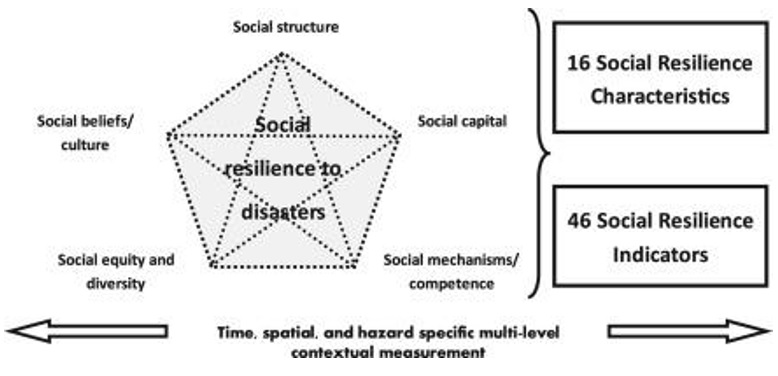
Moreover, having expanded research on social resilience, Saja et al. (2019) conclude that it is vital to ensure consistency in developing and properly understanding social resilience as an immediate component of enduring state-building processes globally. In particular, multiple examples of the decisive role of resilience in stat-building and crisis recovery efforts from different countries have been addressed in the reviewed scholarly literature. The case of Spanish resistance to COVID-19 conducted by Fernandez-Prados et al. (2020) revealed that the pandemic had a negative impact on the resilience of Spanish society, which was one of the factors for diminished coping results. Studies based on the experiences of other states and their population’s resilience, including China (Ye et al., 2020), the USA (Slavich, 2022), and Algeria (Habibi et al., 2020) indicate that resilience is core to crisis management.
Moreover, Canada’s case of social resistance toward natural disasters investigated in the study by Chu et al. (2020) revealed the dependence of resilience level on the socioeconomic status of the population. Economic disparities diminish social resilience and thus obstruct the achievement of sustainable development goals. Chu et al.’s (2020) findings coincide with those of Chesterman, de Battista, and Causse (2021), Dagdeviren et al. (2020), and Dirzyte, Rakauskiene, and Servetkiene (2019) who suggest social resilience challenges is rooted in poverty. Jacinto et al. (2020) state that the concept of social resilience lacks practical implementation guidelines with theoretical models prevailing in research. Similarly, Bean (2018) promotes the term national resilience as a manifestation of a society’s coping ability and claims that this concept lacks theoretical and, moreover, practical addressing.
A large body of literature addressed the threats to social resilience other than social equity issues. Indeed, Garcia and Rime (2019) claim that exposure to crises hinders societies’ resilience due to former failures and traumatic experiences. Moreover, Osei-Kyei et al. (2021) and Tsuchida and Takeda (2021) indicate that natural disasters are one of the most significant threats to building resilience, which is why new practical approaches are required to mitigate such threats. Furthermore, economic crises are viewed by Koos et al. (2017) as a significant trigger of resilience issues. In researchers’ opinion, resilient societies are capable of mobilizing resources, preventing crises, mitigating risks, and addressing disasters in a timely and sustainable manner. Thus, the findings within this theme of literature review imply the necessity of integrating major factors influencing social resilience to ensure proper practical long-term solutions.
Coping Mechanisms and Their Essential Role in Social Resilience
Distress and uncertainty are some of the most prevalent characteristic features of a population’s experiences during a time of crisis. For example, Paredes et al. (2021) found that during COVID-19, psychological threats of the pandemic were harmful to the long-term wellbeing of the population and had a negative impact on its resilience. Indeed, the ability to withstand difficulties depends on experience and preparedness. The disruption of normal life and the lack of readiness for difficulties and crisis management skills triggers “increased psychological tension, concerns, and anxiety, which may have severe psychological and health implications” (Kimchi et al., 2021, p. 416). Indeed, extensive research in social psychology demonstrates that the development of coping mechanisms to advance the preparedness of individuals for crises increases the likelihood of a positive resolution of the difficult situation either on an individual or nation-wide level.
For example, El-Masri et al. (2020) state that “actuating positive emotions as defense mechanisms are found to better cope with stressful situations and ensuing negative emotions” (p. 1835). In other words, the use of deliberate techniques to induce a positive attitude through reassurance of one’s capability of handling an adverse episode constitutes coping strategies for sustained recovery. When taken to the broader scale of a nation, this implication provides a validation of the importance of advancing social resilience by educating people and equipping them with coping tools.
As informed by research, insufficiency in social resilience might be mitigated through establishing a dialogue between policy-makers and society. Some of the ways to establish such a connection are through the use of social media (Reuter and Spielhofer, 2017). Similar insights have been obtained by Sharifi, Khavarian-Garmsir, and Kummitha (2021) and Vogel et al. (2021) who found that technology-assisted programs and channels of communication were particularly helpful in advancing social resilience during COVID-19. Some other theoretically addressed coping mechanisms are perceived to be implemented through the use of resilience fingerprints (Rachunok, Bennett and Nateghi, 2019) and large-scale data analysis of resilience metrics (Johansen, Horney and Tien, 2017). However, the search of the literature revealed a significant gap in recently published studies related to the lack of investigation of practical coping mechanisms that would improve social resilience.
Methodology
This section is devoted to the methodology used within the study. The rationale for choosing the study designs, specific methods of data collection and analysis, and the validation of their application to the investigated issue are validated. The methodology section contains separate subsections aimed at articulating the process and the theoretical basis behind each of the three stages of research, namely literature review, text mining, and survey.
Introduction
The research context and the background of sustainable development of Qatar according to its national strategy imply that the investigation of the relationships between sustainable development and social resilience is a complex issue. In order to address the multifaceted nature of the manifestations of the national strategy, the state’s advantages and challenges in achieving goals in economic, social, and environmental spheres, a multifaceted study methodology is required. Such a methodological strategy is validated by the studies investigating similar issues, using multi-staged study designs. For example, a research study conducted by Jacinto et al. (2020) was conducted using a literature review, text mining, and expert opinions to answer their research questions. Such a diversity of methods used in one study allows for a comprehensive scope of findings, their reliability, verifiability, and consistency, as well as the multidimensional investigation of the research problem. Thus, Figure 2 demonstrates the overall framework of the research.
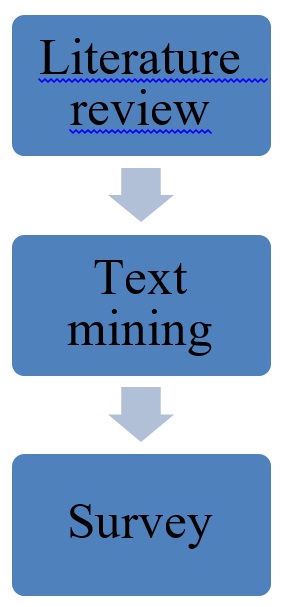
Study Design
The study was based on the combination of qualitative and quantitative approaches, including such data collection and analysis methods as literature review, text mining, and questionnaire. The rationale for choosing mixed design was validated by the diversity of findings contributing to the topic from different data sources, providing insights based on scholarly literature review, document analysis, and opinions of society. Such anticipation is informed by scholarly literature’s indication of the benefits of mixed methods. In particular, according to Paras et al. (2019), the use of mixed methods in the investigation of complex social issues allows for identifying and properly examining a variety of factors that come into play within the investigated problem. Thus, the researcher used both qualitative and quantitative data to find the indicators of the relationships between sustainable development goals and social resilience and their relevance to the Qatar National Vision 2030. A synthesis approach is used to incorporate the findings into one comprehensive framework that allows for answering the research questions and testing the hypothesis.
Theoretical Basis
Since the research involved the formulation of a hypothesis that would be either proved or disregarded by the study findings, the use of a grounded research theory was selected. According to Chun Tie, Birks, and Francis (2019), grounded theory is a frequently used methodology framework that applies to both qualitative and quantitative designs. It is particularly relevant for the areas of investigation that lack data about a phenomenon and consequently allows for developing a theory based on the collected and processed data Chun Tie, Birks, and Francis, 2019). Thus, since there is a limited pool of guidelines as per social resilience’s role in sustainable development in Qatar, as informed by the review of the national strategy document, it is relevant to develop hypotheses (General Secretariat for Development Planning, 2008). Moreover, the use of the grounded theory allowed for structuring the overall research findings toward a comprehensive solution and recommendations for the state of Qatar in relation to social resilience.
Literature Review
The first stage of the three-phase research process within this project was the conducting of an extended literature review. The choice of a literature review as a method of data collection and analysis was validated by the diversity of research questions, which primarily addressed the complexity of relationships between phenomena. Moreover, the use of extended literature reviews in relation to social issues in general and resilience, in particular, has been deemed effective. For example, Rus, Kilar, and Koren (2018) used a literature review approach to collect and analyze scholarly studies on the topic of resilience to natural disasters, which allowed them to identify core themes in the literature, prevailing tendencies, and gaps. Since this research project dealt with the under-addressed phenomenon of social resilience as a pivotal element in state-building efforts within sustainable development, the use of a literature review is essential.
The extended literature review was conducted based on the sources found on scholarly databases, including such large online resources as JSTOR, Science Direct, and Google Scholar. After reviewing several accessible and credible databases, the articles in these three databases were estimated as most sufficient given the study particularities. In total, 48 academic sources were located after a meticulous search strategy. The inclusion criteria for the selected sources were publication date not earlier than 2017, the English language of the article, the article’s relevance to the topic, and the publication in verifiable and reliable journals. The search of relevant literature was initiated with the formulation of a list of keywords that represent basic concepts of the topic. In general, the following keywords were used during the search process:
- sustainable development goals,
- society and sustainable development,
- Qatar National Vision 2030,
- sustainable development in Qatar,
- Qatar security and sustainable development goals,
- social resilience, national resilience,
- social resilience and sustainable development goals.
The pool of the results matching the search criteria and keywords was scanned for the relevance of the titles. Then, the studies were scanned for their applicability after reading abstracts. After that, relevant articles were reviewed in detail, and their contents were categorized into themes depending on the type of implications they provided. Within the context of the research goals and in an attempt to answer the research questions, the identified themes were then analyzed and interpreted to find the resemblance of possible gaps, inconsistencies, and tendencies. These implications were essential for the establishment of the evidential basis for the consecutive stages of the research process due to their contribution to the background of the issue at hand.
Text Mining Analysis of the Qatar National Vision 2030 Document
The method of text-mining was used to conduct an in-depth analysis of the content of the Qatar National Vision 2030 document for its core themes and patterns. The establishment of sustainable development goals and the development of a strategic plan for their implementation are outlined in the document (General Secretariat for Development Planning, 2008). In order to identify the overall approach’s themes in relation to the advancement of the state of Qatar toward sustainable development goals completion, the text-mining method enabled determining patterns and key themes. According to Cookey, Darn Sawasdi, and Ratanachai (2017), text-mining is an invaluable technique for determining similarities and differences between texts to draw on generalized conclusions. Multiple studies have been conducted using text-mining techniques to scan textual information for the repetition of patterns, keywords, and themes. Overall, according to Jung and Suh (2019), the advancement of communication technologies has advanced the method of text mining toward automated tool use for processing large volumes of data. However, the particularities of the study design and its aim, the use of the text mining approach was modified.
In particular, since the research study was based on one document, namely the Qatar National Vision 2030, the text mining was not aimed at comparing it to any other text. Instead, it was tailored to conduct an in-depth analysis of the text of the strategic plan document. Moreover, the aim of this method was not to detect the frequency of word use but rather to select and categorize dominant themes in the text. For that matter, a qualitative text analysis approach was utilized through in-depth multiple readings of the text, identification of contextual implications of the core themes, and their consequent categorization. At the stage of the project planning, the researcher acknowledged the risk of probable inaccuracy in themes’ identification. To mitigate the risks of errors in categorization, the topics that are typically observed in relation to state-building were applied. Overall, the document’s content was categorized into five areas such as politics, economy, society, technology, and sustainability.
In particular, a concept-driven method of text analysis was considered as best applicable in the context of the research background and research questions (Kuckartz, 2019). The concept-driven, or deductive, category identification might be performed through the use of three approaches. Namely, the categories prevailing in the text might be “derived from a theory or derived from the literature (the current state of research) or derived from the research question” (Kuckartz, 2019, p. 184). The categorization of the themes and patterns in the Qatar National Vision 2030 document was based on the research question. Specifically, the first research question (RQ 1: What is the relationship between Qatar’s sustainable development goals and resilience strategies?) was the driver of concept identification and text analysis. Thus, such an approach to text-mining allowed for retrieving reliable results, which helped analyze Qatar’s strategy toward sustainable development goals completion and the role of social resilience in this process.
Survey
This research process stage was aimed at the identification of the society’s awareness of and perspective on the role of resilience in the Qatar National Vision 2030 strategy and the state’s overall sustainable development. The content of the survey questions was validated by the literature findings and the implications of recent research publications, as well as the initial review of sustainable development strategies in Qatar. The ultimate goal of the survey was to ensure that the questions reflect the current state of the issue. It was essential to draw the public’s responses to relevant questions for the evidential contribution of the research study to the body of academic literature on the topic.
Moreover, the rationale for using the survey as a part of this research project’s methodology was validated by the potential of this approach in contributing to evidence on sustainability. Indeed, according to Ligarski and Wolny (2021), the use of close-ended questions with respondents allows for eliciting relevant issues in the social perception of the tentative issues in an accessible, affordable, and verifiable manner. The use of a survey with a set of questions asking for “Agree,” “Disagree” or “Neutral” answers were validated by the ease of implementation, time efficiency, and compatibility with the expectations of online respondents.
The sample of the study included 200 participants who were contacted, among which 180 were recruited and enrolled through the social media platform Facebook. The participants were selected using probability sampling that allowed for random respondent recruitment. The questionnaire was conducted using Google Forms due to its accessibility and affordability, as well as the ease of data processing. The remote mode of conducting this survey was induced by several factors. Firstly, the ongoing COVID-19 pandemic has its restricting impact on social interaction, which is why remote communication using digital means is preferable. Secondly, the large sample of participants might complicate the process of in-person surveying in terms of its cost and time expenses. Therefore, the benefits of online surveying allowed for prioritizing this approach to data collection.
The retrieval of data from the participants was carried out according to the ethical considerations with privacy and confidentiality prioritized. Only demographic data, such as age, gender, ethnicity, and socioeconomic status were collected for the purposes of research. The participants were informed about the study objectives, implications, and planned procedure of survey conducting. The participants signed written consent forms in a remote mode, which validated their participation in the study.
Once the survey responses were collected, simple SPSS software was used for descriptive statistical analysis of the findings. The percentile of answers to each question was examined; the relationship between demographic characteristics and answers was analyzed. At the final stage of the research study, the general implications of the survey findings were synthesized with the findings of other stages of the project to identify the overall results of the study.
Results
This section addresses the results of the research at each of its three stages. First, the results obtained during the literature review are presented in the form of a table with synthesized findings displayed by theme. Second, the results of the text-mining process are presented to depict identified themes and patterns in the text of the Qatar National Vision 2030 document. Finally, the findings of the conducted survey are outlined with the indication of the demographics of the surveyed sample and the percentile of either agreement or disagreement in response to each of the ten questions of the questionnaire.
Literature Review Results
The conducted extensive literature review of relevant and up-to-date sources on the topic of resilience and sustainable development revealed four key themes. In particular, the first theme was Sustainable Development as a Trending Concept in the National Strategy, and the second theme was Sustainable Development and the Achievement of Security Goals for Qatar. The third theme was labeled as The Role of Social Resilience in Sustainable Development, and the fourth theme was Coping Mechanisms and Their Essential Role in Social Resilience. The synthesized results of the conducted extended literature review are presented in Table 1.
Table 1. The Results of the Extended Literature Review
Within Theme 1, the majority of reviewed sources approached sustainable development as an immediate element in state-building with education for sustainable development, and society’s inclusion in the process is essential for successful goal achievement.
Theme 2 was characterized by the ambiguity of findings describing the relationships between security and sustainable development. Both negative patterns and positive implications of sustainable development goals on cultural heritage and political peace were identified.
Within Theme 3, the concept of social equity has been found to have particular importance in advancing opportunities for social resilience improvement. The crucial importance of social resilience in sustainable development was consistent across all reviewed sources within this theme; limited practice-based evidence on the improvement of social resilience was found.
It was detected that there is scarce research into practical solutions and a gap in coping mechanisms research within Theme 4.
Text Mining Results
There are five themes in the Qatar National Vision 2030 strategic document, namely politics, economy, society, technology, and sustainability. Within each of them, several key themes, concepts, and patterns have been identified. The results of the multiple readings and text-mining of the document are presented in Table 2. The findings are further integrated into those obtained from the literature review and the survey to answer the research questions. In total, there were fifteen key recurring themes identified within the document and subsequently categorized into the five above-mentioned categories. As for the concepts and patterns, they were identified through the detection of the most recurring terminologies, ideas, and lexemes, which also have been grouped according to the categories.
Table 2. The Results of Text Mining
Survey Results
The results of the questionnaire demonstrate the trends in Qatar’s citizens’ perception of social resilience and its role in advancing Qatar toward a sustainable future. The results obtained from the answers to each of the questions demonstrate the tendencies in the population of Qatar. The following subsections are devoted to the representation of findings according to each question separately.
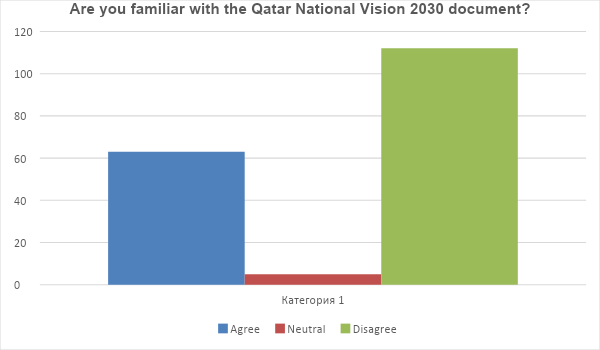
The majority of respondents were not familiar with the document.
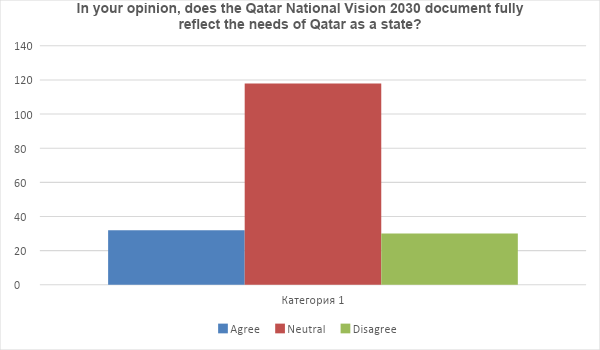
The prevailing percentage of participants were neutral in responding whether the document reflected the needs of Qatar as a state, while the number of those who answered positively was insufficiently higher than those with negative responses.
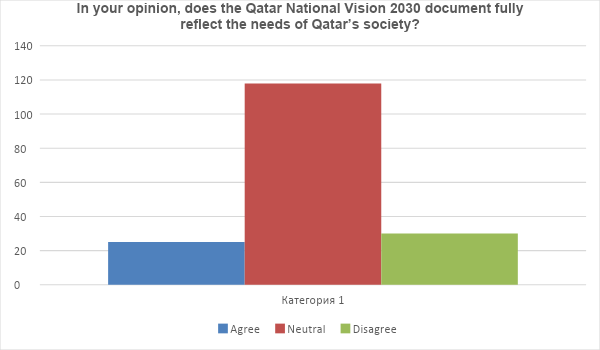
Similar to question 2, the majority of respondents were neutral; however, among those answering the question either in a positive or negative way, the prevalent number of participants did not agree that the document met the needs of Qatar’s society.
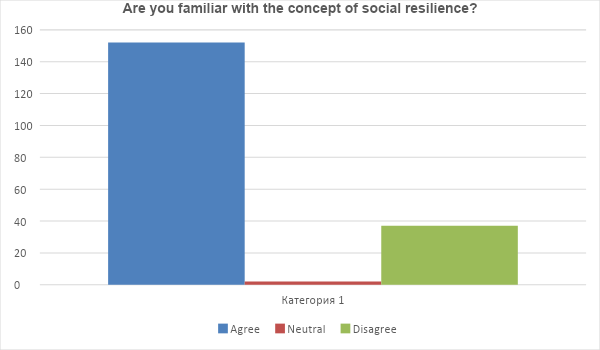
The majority of respondents were familiar with the concept of social resilience.
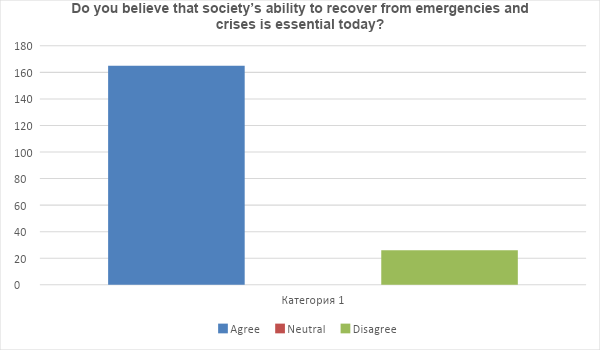
A prevalent segment of respondents agreed that it was essential for society to be able to recover from emergencies, with no participants remaining neutral.
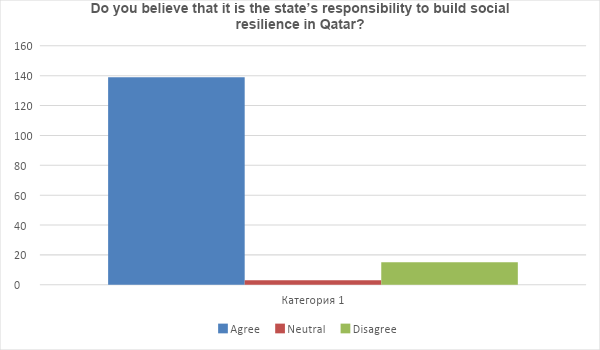
Almost all of the respondents considered that the government should be responsible for building social resilience.
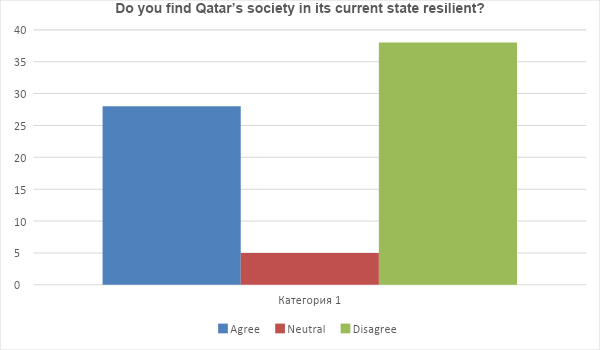
A larger part of respondents’ answers were on the negative side, meaning that they did not consider the current state of social resilience sufficient.
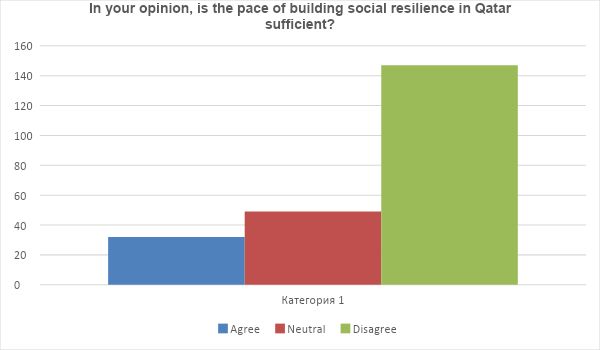
Similar to the previous question, the majority of answers were negative showing that respondents do not consider the pace of resilience building in Qatar sufficient.
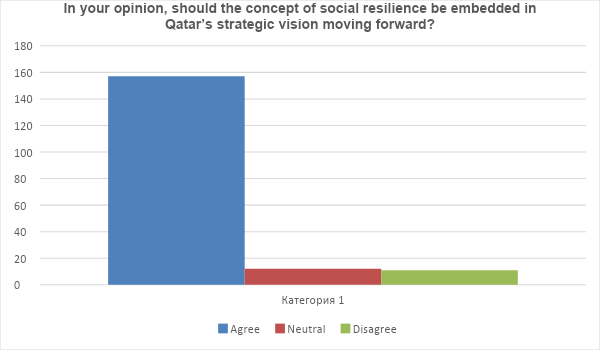
The prevailing majority of responses were positive with the indication that social resilience should be a part of state-building in Qatar.
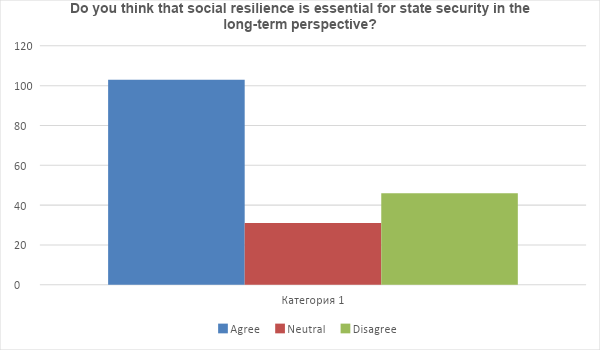
A larger part of responses supported the claim that social resilience was important for state security.
When synthesizing the overall responses with demographic data, the results demonstrate that women were more likely to give positive answers to questions 4, 5, 6, 9, and 10 and negative answers to questions 8, 2, and 3. Such a distribution indicates female’s more active inclusion in social issues. Male respondents were more likely to answer neutral throughout the survey. Participants aged 31-45 gave the least neutral answers and predominantly responded positively to questions 1, 2, 3, and 4. Arab ethnicity respondents disagreed with questions 2, 3, and 7, which indicates their critical attitude toward resilience strategies in the state. Finally, the representatives of a low socio-economic class were most prone to answer negatively to questions 1, 4, and 5, which indicates their unawareness or dissatisfaction of social resilience in the state of Qatar.
Discussion
When viewed from a synthesized perspective, the study findings combined to confirm the hypothesis that social resilience has a direct impact on the ability of a state to achieve its sustainable development goals. The literature review indicated that sustainable development issues and challenges were associated with the lack of proper interconnectedness between goals and the insufficient preparedness of the population toward the sustainable goal implementation. Text-mining results indicated that the Qatar National Vision 2030 lacks a direct indication of social resilience as a concept but implicitly emphasizes the crucial role of society’s longevity and agility within all the development domains. Finally, the outcomes of the survey indicated that the majority of respondents valued social resilience as a pivotal aspect of state-building, security, and sustainable growth. The findings of the research study are congruent with some exemplar scholarly articles within the body of literature on the issue, which is evident from each of the research questions answered.
What is the relationship between Qatar’s sustainable development goals and resilience strategies?
As informed by the results of the text-mining of the Qatar National Vision 2030 document, the majority of recurring themes within the spheres of society, economy, technology, and sustainability evolved around the public. Indeed, the national strategy is built on the pillars that predetermine educational, training, innovation, and investment efforts that would prepare the population of the state toward the challenges of change. The changes are perceived to have threats in terms of the transformation of the economy toward green technologies and a knowledge-based economy. However, although social resilience is implicitly addressed in the document, it is insufficient in the context of preparing society for crisis management. These findings are consistent with those retrieved from the literature review indicating the lack of practical solutions for social resilience improvement in Qatar. In particular, the studies by Jacinto et al. (2020) and Bean (2018) are congruent with the current findings stating that the relationship between sustainable development and social resilience is a practice-based one. Moreover, these outcomes are supported by survey findings indicating the lack of satisfaction of the population with the current state of social resilience in the country.
Is Qatar’s well-being dependent on realizing sustainable development only or resilience?
Given the synthesized findings of the three stages of the research, the well-being of Qatar is dependent on both sustainable development and resilience since the former is impossible without the latter. Indeed, the literature review findings combined with survey results indicate that to sustain the state’s development, the society must be educated, equipped, and psychologically prepared to cope with crises and challenges. These findings coincide with those presented by El-Masri et al. (2020), Kimchi et al. (2021), and Paredes et al. (2021), who emphasized that developing coping mechanisms in the public is essential for sustaining any development in the state or community. Furthermore, the outcomes of the text-mining method demonstrate that sustainable development is viewed by the national leaders as a trigger of the state’s well-being. However, the core of implementing sustainable development goals is in the educational and health care efforts that would prepare the population to overcome challenges of future progress.
Is sustainable development enough for peaceful regional integration and cooperation?
The investigation of the issue of security was characterized by scarce findings during all three stages of the research. Nonetheless, the findings of the literature review indicate that since Qatar is a small and vulnerable country economically reliant on natural resources and exposed to political unrest in the region, there are threats to its sustainable development. For that matter, mere sustainable development would not be enough to preserve peace; social resilience is essential to ensure state security. Such observations have been validated by the results of the survey, where the majority of respondents agreed that social resilience is pivotal for state peace and security. Overall, these findings are congruent with those presented in the current literature on the topic (Al-Jaber and Al-Ghamdi, 2020; Fotros and Torkamani, 2019; Zaidan, Al-Saidi, and Hammad, 2019) and contribute an additional piece of evidence to the academic domain.
What is the significance of resilience in sustaining Qatar after realizing its sustainable development goals?
The results of the study imply that the resilience of the society plays a decisive role in Qatar’s well-being after it realizes its sustainable development goals. The threats to the achieved results in either of the domains, including political, economic, technological, social, or environmental, might disrupt the state’s strategic development. Text-mining revealed the prevalence of social themes with the emphasis on human development through education to sustain Qatar’s development under the influence of future challenges. Furthermore, the research findings on socio-economic disparities hindering the opportunities for improved social resilience have coincided with the scholarly literature. In particular, the survey findings indicated that respondents from a low socio-economic class were the least familiar with the concept of social resilience and satisfaction with the level of it. These findings coincides with the results of studies conducted by Chesterman, de Battista, and Causse (2021), Chu et al. (2020), Dagdeviren et al. (2020), and Dirzyte, Rakauskiene, and Servetkiene (2019). Moreover, the results of the survey indicate that people have limited awareness about the national strategy, and are unsatisfied with the current state of resilience, which implies the need for improvement.
Conclusions and Recommendations
Concluding the research study, the implementation of sustainable development goals in Qatar is a challenging endeavor that drives Qatar National Vision 2030’s accomplishment. The study used a multifaceted three-fold research design consisting of an extended thematic literature review, text mining, and survey to investigate the relationships between sustainable development and social resilience. Overall, it was hypothesized that the achievement of sustainable development goals would not be sufficient without improving the social responsibility of the general public in Qatar. This hypothesis was supported by the findings obtained during the three stages of the study. Moreover, the findings allowed for effective answering of such research questions as:
- RQ 1: What is the relationship between Qatar’s sustainable development goals and resilience strategies?
- RQ 2: Is Qatar’s well-being dependent on realizing sustainable development only or resilience?
- RQ 3: Is sustainable development enough for peaceful regional integration and cooperation?
- RQ 4: What is the significance of resilience in sustaining Qatar after realizing its sustainable development goals?
The themes identified in the course of the extended literature review, key topics, concepts, and patterns retrieved upon text-mining, and the trends in public opinion on the topic synthesized from the survey were insightful. Overall:
- Resilience strategies predetermine sustainable development and should be integrated into national development plans as an essential element;
- Qatar’s well-being depends on the integration of both resilience and sustainable development; sustainable development is impossible to maintain in isolation from social resilience improvement;
- Sustainable development is important in peaceful integration and cooperation; however, it is insufficient in the long-term perspective without national resilience;
- Social resilience obtained due to education, training, and cultural advancement is an immediate element in Qatar’s sustained development after the implementation of its goals.
Given the outcomes of the study, there are several recommendations that might be derived and further implemented for future research and practical implementation at a national and community level. Firstly, it is recommended to build a well-aligned accessible dialogue between government and society that would allow for collecting and processing the incentives and providing feedback. Secondly, the use of social media and technology-informed tools to collect and process resilience-related data is recommended within the framework of the state’s national strategy. Thirdly, it is essential to educate people on the principles, techniques, and coping mechanisms applicable to social resilience to raise awareness about crisis management and improve the society’s ability to sustain its development long-term. Fourthly, based on the research findings, it is recommended to advance national systems for preventing, mitigating, and preparing for crises of natural, healthcare, social, environmental, or economic types. Finally, the state authorities and key actors should integrate resilience into the national sustainable development framework by explicitly addressing it as one of the tasks for achieving sustainability. In such a manner, these recommendations will allow for more consistent and enduring success of Qatar’s national vision achievement.
References
Al-Dosari, N. (2021) ‘Sport and international relations: Qatari soft power and foreign policy making’, Tajseer Journal, 3(2), pp. 1-24.
Al-Hammadi, M. I., and Alkaabi, I. M. (2021) ‘Socio-economic development, globalization and the need for heritage policy in Qatar: case study’, Open Journal of Social Sciences, 9(3), pp. 435-456.
Ali, A. S. M. et al. (2020) ‘Towards better surveillance for coral ecosystems in Qatar: stakeholder engagement in EBM approach’, International Journal of Environmental Science and Development, 11(4), pp. 194-201.
Alizadeh, H. and Sharifi, A. (2021) ‘Analysis of the state of social resilience among different socio-demographic groups during the COVID- 19 pandemic’, International Journal of Disaster Risk Reduction, 64, 102514.
Al-Jaber, M. A., and Al-Ghamdi, S. G. (2020) ‘Effect of virtual learning on delivering education as part of the sustainable development goals in Qatar’, Energy Reports, 6, 371-375.
Al-Kuwari, M. M., Du, X., & Koç, M. (2021) ‘Performance assessment in education for sustainable development: a case study of the Qatar education system’, Prospects, 1-15.
Allen, C., Metternicht, G., and Wiedmann, T. (2018) ‘Initial progress in implementing the Sustainable Development Goals (SDGs): a review of evidence from countries’, Sustainability Science, 13(5), pp. 1453-1467.
Al Thani, M. (2021) ‘Channelling soft power: the Qatar 2022 World Cup, migrant workers, and international image’, The International Journal of the History of Sport, 28(10), pp. 1-24.
Al-Zoby, M. (2019) ‘Culture and the politics of sustainable development in the GCC: identity between heritage and globalisation’, Development in Practice, 29(5), pp. 559-569.
Baabood, A. (2017) ‘Qatar’s resilience strategy and implications for state-society relations,’ Istituto Affari Internazionali – Foundation for European Progressive Studies, 17(36), pp. 1-22.
Bean, H. (2018) ‘National resilience’, Journal of Applied Communication Research, 46(1), pp. 23-25.
Berawi, M. A. (2020) ‘Empowering healthcare, economic, and social resilience during global pandemic COVID-19’, International Journal of Technology, 11(3), pp. 436-439.
Chesterman, A., de Battista, M., and Causse, E. (2021) ‘Effects of social position and household affordances on COVID-19 lockdown resilience and coping’, Journal of Environmental Psychology, 78, p. 101687.
Chu, S. H. Y. et al. (2020) ‘Social resilience to flooding in Vancouver: the issue of scale’, Environmental Hazards, 20(4), pp. 400-415.
Chun Tie, Y., Birks, M., & Francis, K. (2019) ‘Grounded theory research: a design framework for novice researchers’, SAGE Open Medicine, 7, pp. 1-8.
Cookey, P. E., Darn Sawasdi, R., and Ratanachai, C. (2017) ‘Text mining analysis of institutional fit of Lake Basin water governance’, Ecological Indicators, 72, pp. 640-658.
Dagdeviren, H. et al. (2020) ‘Structural foundations of social resilience’, Social Policy and Society, 19(4), pp. 539-552.
Dalevska, N. et al. (2019) ‘A model for estimating social and economic indicators of sustainable development’, Entrepreneurship and Sustainability Issues, 6(4), p. 1839.
Dirzyte, A., Rakauskiene, O. G. and Servetkiene, V. (2019) ‘Evaluation of resilience impact on socio-economic inequality’, The International Journal Entrepreneurship and Sustainability Issues, 4(4), pp. 489-501
El-Masri, M. et al. (2019) ‘Positive sentiments as coping mechanisms and path to resilience: the case of Qatar blockade’, Information, Communication & Society, 24(13), 1835-1853.
Fernandez-Prados, J. S. et al. (2020) ‘Factors explaining social resilience against COVID-19: the case of Spain’, European Societies, 23(1), pp. 111–121.
Fonseca, L. M., Domingues, J. P., and Dima, A. M. (2020) ‘Mapping the sustainable development goals relationships’, Sustainability, 12(8), pp. 1-15.
Fotros, M. H., & Torkamani, E. (2019) ‘Energy justice and sustainable development goals: the case of common gas field projects of Iran and Qatar’, Petroleum Business Review, 3(4), pp. 19-27.
Franke, V. C., & Elliott, C. N. (2021) ‘Optimism and social resilience: social isolation, meaninglessness, trust, and empathy in times of COVID-19’, Societies, 11(2), 35.
Garcia, D. and Rime, B. (2019) ‘Collective emotions and social resilience in the digital traces after a terrorist attack’, Psychological Science, 30(4), pp. 617-628.
General Secretariat for Development Planning. (2008) Qatar National Vision 2030.
Habibi, Y. et al. (2020) Analysis of social resilience to the novel coronavirus (COVID-19) in Algeria’, Geomatics, Landmanagement and Landscape, 3, pp. 19-29.
Hayman, R. (2019) ‘The contribution of civil society to sustainable development in the Gulf and beyond’, Development in Practice, 29(5), pp. 645-650.
Jacinto, R. et al. (2020) ‘Indicators for the assessment of social resilience in flood-affected communities – a text mining-based methodology’, Science of The Total Environment, 744, 140973.
Johansen, C., Horney, J., and Tien, I. (2017) ‘Metrics for evaluating and improving community resilience’, Journal of Infrastructure Systems, 23(2), 04016032.
Jung, Y. and Suh, Y. (2019) ‘Mining the voice of employees: a text mining approach to identifying and analyzing job satisfaction factors from online employee reviews’, Decision Support Systems, 123, pp. 1-12.
Kimhi, S. et al. (2019) ‘National resilience: a new self-report assessment scale’, Community Mental Health Journal, 55(4), 721-731.
Kimhi, S. et al. (2021) ‘Distress and resilience in days of COVID-19: international study of samples from Israel, Brazil, and the Philippines’, Cross-Cultural Research, 55(5), pp. 415-437.
Koos, S. et al. (2017) ‘Coping with crises: consumption and social resilience on markets’, International Journal of Consumer Studies, 41(4), pp. 363-370.
Kuckartz, U. (2019) ‘Qualitative text analysis: a systematic approach’, In Compendium for Early Career Researchers in Mathematics Education (pp. 181-197). Springer, Cham.
Ligarski, M. J. and Wolny, M. (2021) ‘Quality of life surveys as a method of obtaining data for sustainable city development – results of empirical research’, Energies, 14(22), pp. 1-20.
Meza Talavera, A., Al-Ghamdi, S. G., & Koç, M. (2019) ‘Sustainability in mega-events: beyond Qatar 2022’, Sustainability, 11(22), pp. 1-27.
Nasser, A. L. (2020) ‘Analysis of the anticipated and potential contribution of mega sporting events in achieving sustainable development goals: a case of the 2022 FIFA World Cup in Qatar’, Journal of Developing Country Studies, 5(1), pp. 1-24.
Osei-Kyei, R. et al. (2021) ‘Critical review of the threats affecting the building of critical infrastructure resilience’, International Journal of Disaster Risk Reduction, 60, p. 102316.
Paras, A., et al. (2019) ‘Understanding how program factors influence intercultural learning in study abroad: the benefits of mixed-method analysis’ Frontiers: The Interdisciplinary Journal of Study Abroad, 31(1), pp. 22-45.
Paredes, M. R. et al. (2021) ‘The impact of the COVID-19 pandemic on subjective mental well-being: the interplay of perceived threat, future anxiety and resilience’, Personality and Individual Differences, 170, p. 110455.
Pereirinha, J. A. C. and Pereira, E. (2021) ‘Social resilience and welfare systems under COVID-19: a European comparative perspective’, Global Social Policy, 21(3), pp. 569-594.
Rachunok, B. A., Bennett, J. B., and Nateghi, R. (2019) ‘Twitter and disasters: a social resilience fingerprint’, IEEE Access, 7, pp. 58495-58506.
Reuter, C. and Spielhofer, T. (2017) ‘Towards social resilience: a quantitative and qualitative survey on citizens’ perception of social media in emergencies in Europe’, Technological Forecasting and Social Change, 121, pp. 168-180.
Richer, R. A. (2014) ‘Sustainable development in Qatar: challenges and opportunities,’ QScience Connect, 2014(1), pp. 1-14.
Rus, K., Kilar, V., and Koren, D. (2018) ‘Resilience assessment of complex urban systems to natural disasters: a new literature review’, International Journal of Disaster Risk Reduction, 31, 311-330.
Sahin, E. S., Bayram, I. S., and Koc, M. (2019) ‘Demand side management opportunities, framework, and implications for sustainable development in resource-rich countries: case study Qatar’, Journal of Cleaner Production, 241, pp. 1-64.
Saja, A. M. A. et al. (2018) ‘An inclusive and adaptive framework for measuring social resilience to disasters’, International Journal of Disaster Risk Reduction, 28(1), pp. 862–873.
Saja, A. M. A. et al. (2019) ‘A critical review of social resilience assessment frameworks in disaster management’, International Journal of Disaster Risk Reduction, 35(1), 101096.
Sharifi, A., Khavarian-Garmsir, A. R., and Kummitha, R. K. R. (2021) ‘Contributions of smart city solutions and technologies to resilience against the COVID-19 pandemic: a literature review’, Sustainability, 13(14), 8018.
Slavich, G. M. (2022) ‘Social safety theory: understanding social stress, disease risk, resilience, and behavior during the COVID-19 pandemic and beyond’, Current Opinion in Psychology, 101299.
Stafford-Smith, M. et al. (2017) ‘Integration: the key to implementing the sustainable development goals’, Sustainability Science, 12(6), pp. 911-919.
Tsuchida, R. and Takeda, S. (2021) ‘Is resilience socially emerging or embedded?: a review of “resilience” under climate change in Sri Lanka’, Journal of Safety Science and Resilience, 2(4), pp. 258-266.
Vogel, P. et al. (2021) ‘Fostering social resilience via online neighborhood social networks during the COVID-19 pandemic and beyond: status quo, design dilemmas and research opportunities’, In Proceedings of the 54th Hawaii International Conference on System Sciences (p. 3037).
Weber, I. et al. (2021) ‘Non-traditional data sources: providing insights into sustainable development’, Communications of the ACM, 64(4), pp. 88-95.
Ye, Z. et al. (2020) ‘Resilience, social support, and coping as mediators between COVID‐19‐related stressful experiences and acute stress disorder among college students in China’, Applied Psychology: Health and Well‐Being, 12(4), pp. 1074-1094.
Zaidan, E., Al-Saidi, M., and Hammad, S. H. (2019) ‘Sustainable development in the Arab world–is the Gulf Cooperation Council (GCC) region fit for the challenge?’, Development in Practice, 29(5), pp. 670-681.